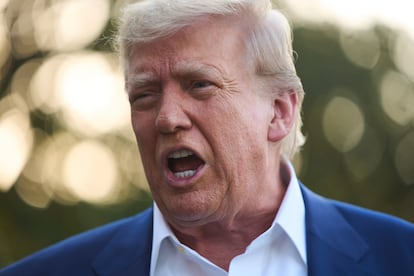After Trump blasts Israel, Netanyahu agrees to halt attacks on Iran
The US president criticized both countries for violating the ceasefire: ‘They don’t know what the fuck they’re doing’


U.S. President Donald Trump announced a ceasefire between Israel and Iran on Monday, presenting it as the end of the latest crisis — only to be met with the reality of their entrenched and volatile relationship.
On Tuesday, Trump criticized the situation in a series of fiery posts on his social network, Truth Social, and later spoke to reporters waiting for him on the White House lawn before boarding the Marine One helicopter at the start of his trip to The Hague (Netherlands), where he is scheduled to attend the NATO summit.
In blistering, profanity-laced comments, Trump accused both countries of breaking the promise they had made the day before to halt cross-border attacks. He said “they don’t know what the fuck they’re doing” and directed particular ire at Israel, in a rare public display of anger toward one of the U.S.’s closest allies.
“I’m not happy with Israel,” Trump said. “I didn’t like plenty of things I saw yesterday. I didn’t like the fact that Israel unloaded right after we made the deal. They didn’t have to unload… The retaliation was very strong."
The U.S. president also expressed his discontent with Iran, but to some extent excused the country, claiming that Tehran only fired “one rocket that didn’t land that was shot, perhaps by mistake.”
Trump also said that during his trip, he has “to get Israel to calm down now.” Later, both the Washington political news site Axios and the Israeli press reported that the U.S. president had called Israeli Prime Minister Benjamin Netanyahu to demand that he stop the attacks. According to those reports, Netanyahu replied that such a request was impossible, and that the most he could do was to moderate the intensity of the bombings.
On Truth Social, Trump again claimed victory, asserting that the issue was resolved and that “all [Israeli] planes” would “turn around.” Netanyahu’s office then announced that following the conversation between the two leaders, Israel “refrained from further attacks.”
The “12-day war”
The fragile ceasefire was set to take effect, according to a surprising announcement by the U.S. president on Truth Social, at midnight Washington time (7:00 a.m. in Jerusalem and Tehran). Trump proudly stated that this cease-fire would bring an end to what he called “the 12-Day War,” a label that nods to another historic conflict that shaped the region — the Six-Day War of 1967 — and refers to the time elapsed since June 13, when Netanyahu ordered an attack on Iran under the still-unproven pretext that the Islamic regime is close to obtaining a nuclear bomb.
Trump’s announcement was followed by several hours of confusion. At first, neither country confirmed the existence of an agreement. Then, Iran’s Foreign Minister denied it, only for state television to later claim they would abide by it. Israel eventually agreed to comply, but shortly afterward reported detecting missiles “launched from Iran” and ordered its military to carry out new “high-intensity” strikes against the Iranian capital. Tehran denied breaking the ceasefire.
That’s when Trump blew up. He expressed his anger, especially at Israel. In an all-caps message on Truth Social, he said: “Israel. Do not drop those bombs. If you do, it is a major violation [of the ceasefire agreement]. Bring your pilots home, now!” Ten minutes later, he posted again, saying Israel “is not going to attack Iran” and that the “ceasefire is in effect.”
He addressed Iran in a third post: “Iran will never rebuild their nuclear facilities!”
Trump was referring to the three uranium enrichment plants attacked by U.S. aircraft last weekend in a military operation that not only broke the U.S. president’s campaign promise to avoid new military entanglements but also ended four and a half decades of containment policy toward Iran by previous U.S.administrations.
That attack was met on Monday with a timid retaliation: missile launches from Iran targeting the U.S. base at Al Udeid, Washington’s largest facility in the Middle East, located on the outskirts of Qatar’s capital, Doha. The attack caused no casualties, and 13 of the 14 projectiles were intercepted before impact, according to Trump in another Truth post. Still, the Iranian regime’s TV broadcaster, which reported on the ceasefire, portrayed it as the result of a show of force that made both rivals back down.
Sign up for our weekly newsletter to get more English-language news coverage from EL PAÍS USA Edition
Tu suscripción se está usando en otro dispositivo
¿Quieres añadir otro usuario a tu suscripción?
Si continúas leyendo en este dispositivo, no se podrá leer en el otro.
FlechaTu suscripción se está usando en otro dispositivo y solo puedes acceder a EL PAÍS desde un dispositivo a la vez.
Si quieres compartir tu cuenta, cambia tu suscripción a la modalidad Premium, así podrás añadir otro usuario. Cada uno accederá con su propia cuenta de email, lo que os permitirá personalizar vuestra experiencia en EL PAÍS.
¿Tienes una suscripción de empresa? Accede aquí para contratar más cuentas.
En el caso de no saber quién está usando tu cuenta, te recomendamos cambiar tu contraseña aquí.
Si decides continuar compartiendo tu cuenta, este mensaje se mostrará en tu dispositivo y en el de la otra persona que está usando tu cuenta de forma indefinida, afectando a tu experiencia de lectura. Puedes consultar aquí los términos y condiciones de la suscripción digital.








































